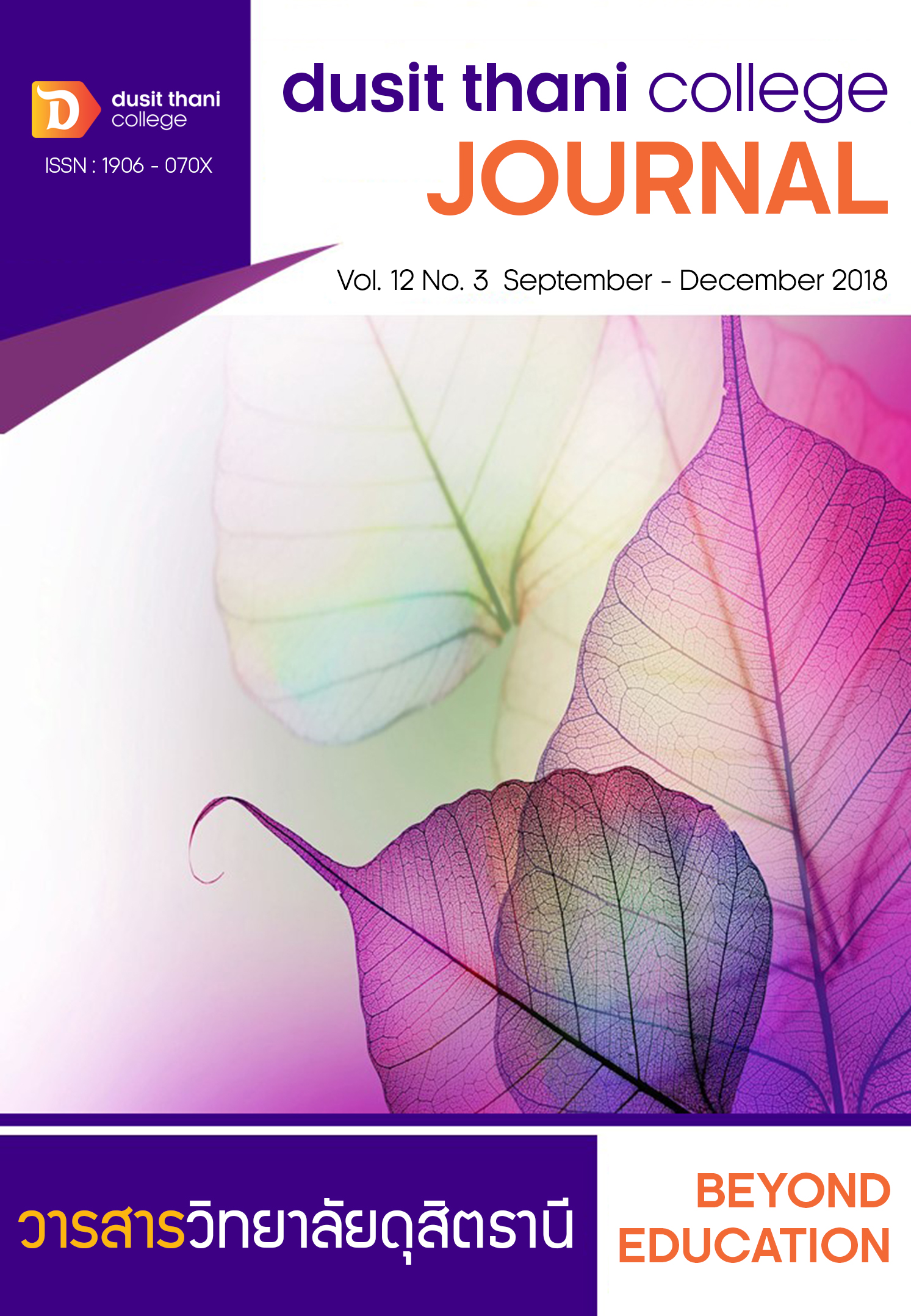Community Tourism: A New Alternative to Sustainability
Main Article Content
Abstract
Tourism is an important service industry that has a great impact on the economy. Can make money for the country. Nowadays there are many variations to meet the needs of consumers. To create a new alternative to tourism that is linked to sustainable communities. It is community tourism, so this research aims to study the success factors of community tourism. By the reviewing of literature and analyzing relevant documents from relevant documents locally and internationally. The analyze success factors of community-based tourism. Including various barriers from the indicated of study the key to successful community-based tourism is community engagement, conservation and management that emphasizes the interactions between local people communities and nature. The nature of the interaction between conservation of resources for tourism and the development of local communities is strengthened. To make the community tour successful. By engaging people in the community to collaborate on community resource conservation through good management. To enable the community to bring the potential of both resources. People of natural resources, culture, traditional to use more effectively.
Article Details
Article Screening Policy
- All research and academic articles to be published must be considered and screened by three peer reviews in the relevant field / article.
- All articles, texts, illustrations and tables published in the journal are the personal opinions of the authors. Editors don't always have to agree. And no responsibility whatsoever is the sole responsibility of the author.
- The articles to be published must never be published. Where did you first publish? And not in the consideration of other journals If the audit found that there has been a duplicate publication It is the sole responsibility of the author.
- Any article that the reader sees as being plagiarized or impersonated without reference. Or mislead the work of the author Please let the journal editor know it will be your greatest blessing.
References
Planning Association, 35 (4), 216 – 224. 2. Bartol, K.M., Martin, D.C. (1998). Management. McGraw Hill.
3. Chailngsri Pimonsompong. (2017). Tourism Research: Principle to Practice in Social Reflective
Perspective Journal of Business Economics and Communication, 12 (1), 1-5.
4. Cohen, S. L. (1996). Mobilizing Communities for Participation and Empowerment. In Participatory Communication for Social Change. J. Servaes, T. L. Jacobson and
S. A. White, eds. New Delhi: Sage. Pp. 223-284
5. Cooper, Chris and Hall, M. C. (2008). Contemporary Tourism: An International Approach. Oxford: Butterworth-Heinemann.
6. David A. Fennell. (1999). Tourism ethics. Canada : Brock University.
7. De Negri et al. (1998). Empowering Communities: Participatory Techniques for Community Based Programme Development. Nairobi: The Centre for African Family Studies (CAFS).
8. Kampetch, P and Jitpakdee, R. (lecturer). (November 24, 2017). Success factors for
management by community based tourism to sustainable. in Proceeding of The 7th STOU National Research Conference (pp. 564-575). Bangkok: Sukhothai Thammathirat University - Thailand.
9. Kasem Jankaew. (2001). Environmental science. Bangkok: Kasetsart University Press.
10. Kesorn Sawangpanapan. (2012). Sustainable tourism potential of the Tan Tanod : a case study of Tan Tanod community, Tham Rong sub district, Ban Lat district, Phetchaburi province. Cultural Resource Management, Graduate School, Silpakron University.
11. Leiper, N. (1979). The framework of tourism: towards a definition of tourism, tourist, and the tourist industry. Annals of Tourism Research, 6(4), 390-407.
12. Leiper, N. (1995). Tourism Management. Australia: RMIT Press, Collingwood.
13. Niwat Ruangpanit. (1999). The conservation of natural resource and environment.
Bangkok: Green Fence.
14. Pathumporn Voratitipong. (2009). The Development of Curriculum on Sustainable
Tourism Management for the Community. Research and Curriculum Development
King Mongkut’s University of Technology North Bangkok.
15. Pitoon Thongchin. (2015). Managing collaboration in community based tourism on Lanta Island, Krabi Province. Business Administrstion (Tourism Management) Prince of Songkla University.
16. Pimlapas Pongsakornrungsilp. (2014). The Management of Sustainable Community-Based Tourism: The Case of Ban Kokekrai, Phang Nga Province. Veridian E-Journal, 7 (3), 650-665.
17. Potjana SuanSri. (2003). Community Based Tourism Handbook. Bangkok: Responsible
Ecological Social Tour.
18. Richards, G. & Wilson, J. (2006). Developing creativity in tourist experiences: A solution to the serial reproduction of culture?. Tourism Management, 27 (2006), 1209–1223.
19. Rue, L.W., & Byars, L.L. (2005). Management: Skills and Application. (Eleventh Edition). New York: New York. The McGraw Hill Companies
20. Sin Sarobon and Udon Wongtabtim (2003). Community-Based Tourism Conceptualized and Experienced from North Thailand. Chiang Mai. Vanida Press.
21. Singhal, A. (2001). Facilitating Community Participation through Communication for \
Social Change. New Delhi: Sage.
22. Siriwan Sareerat, et al. (2003). Marketing Strategic and Strategic Management aimed at the market. Bangkok : Thanasarn.
23. Sittanon, K. and Prajaknad, P. (2017). Thai Tourists’ Lifestyle, Online Media Use and
Purchasing Intention of Tourism Products and Services. Journal of communication and management NIDA, 2 (1), 1-17.
24. Soitrakool (Teuvayanonda) Attamana (2007). Organizational Behavior: Theory and
Applications. (4 th ed) Bangkok: Thammasat University
25. Somyot Nowkawee. (1993). Management. Bangkok: Dokya.
26. Sudthanom Tancharoen. (2017). Community Based TourismManagementand Sustainable Tourism Development of Bangkantaek Communityin Samutsongkhram Province. Journal of International and Thai Tourism. 13 (2), 1-24.
27. Supapron Prasongthan. (2003). Social Capital Potentiality for Creative Community Based Tourism: The Study of Tai Puan Community, Pak Plee District, Nakorn Nayok Province. Journal of Social Sciences Srinakharinwirot University, (2003)
Retried 14 September 2016, from file:///C:/Users/Nidapoll/Downloads/3819-12435-1-PB%20(1).pdf
28. Theeradech Choomanee. (2014). Pred Nai Community Tambon Huang Nam Kao Trat
Province. Public Aad Private Management. Burapha University.
29. Wanwimon Phoonak. (2015). The Potentials of Amphawa Community in Managing
Community-Based Tourism of the Amphawa Floating Market. Academic Services Journal Prince of Songkla University. 26 (1), 63-74.
30. White, Shirtey A. (1994). The concept of participation Transforming rhetoric into reality. In S.A. White (Ed), Participatory Communication. Thousand Oaks:Sage Publications.
31. Wirote Jiraphan. (2011). Ecotourism. Bangkok: Seangdow.
32. World Tourism Organization. (2004). Indicators of Sustainable Development for
Tourism Destinations A Guidebook (English version). Retried 14 September 2016, from https://www.e-unwto.org/doi/book/10.18111/9789284407262.
33. Uraiwon Supani. (2013). Community-Based Tourism Management Case Study “Palm
Paddy Sea” Community Cultural Way. Sa-Ting Phra District, Songkhla Province. RMUTP Research Journal Special Issue.


